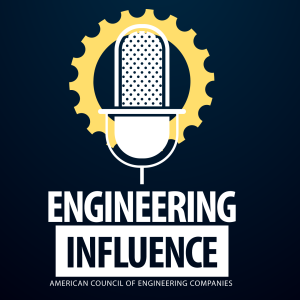
Engineering Influence from ACEC
News:Business News
Transcript:
Host: Welcome to another addition of Engineering Influence, a podcast by the American Council of Engineering Companies. Continuing with our series of interviews with ExCom members who are in Washington today for orientation for the New Year. And I'm very pleased to be joined by Gary Raba of Texas. Gary, if you want to kind of introduce yourself to the audience out there who may not know you - where are you from and what do you do?
Gary Raba: Well, thanks. Very happy to be here. Gary Raba, like you said Raba Kistner Incorporated. We're about a 50 year old - well we started off as being a family owned business in Texas, doing geotechnical work, construction materials, engineering and testing and now branched off and doing some environmental work as well as owner's rep and some other really cool project related stuff on the environmental side.
Host: And you're in town of course, for the orientation. What made you get involved with the volunteer leadership portion of the association. And how did you kind of approach that, you know, as, as, as a member of ACEC?
Gary Raba: Well, when I first started I was in Austin, Texas actually starting in my career, we just bought a company. I was put into a leadership position and I looked around and I said, where do I need to go to meet the guys that really know how to run an engineering company? Cause I needed a little bit of mentoring and training and ACEC had an Austin chapter. So I got actively engaged in that chapter and, and have been hooked since the early eighties on this, on this organization.
Host: That seems to be the common factor of people I talk to. They, you know, they go to a conference or they get involved and then all of a sudden they're hooked in and, and they just keep on moving up.
Gary Raba: Well, what's, what's, what's so cool about the organization and you see it across the country now, is that you have a peer group that is already probably experienced what you've experienced and, and in, in the light jokingly way, they can steer you out of trouble and out of the fire. But there's no competitive nature with respect to good advice.
Host: Yeah. Another commonality is the idea that, you know, coming in a leadership position having that opportunity to talk to your peers who may have faced the same situation or, or, you know, in a different area of the country, but they might be able to provide some insight that you otherwise wouldn't get not having that exposure to a larger group.
Gary Raba: Oh, yeah. You know, Texas and the nation had just come out of a recession. Guess what was facing us further down the line. And about four or five years after that, in the late eighties was another recession, another turndown in economy. And I was awfully blessed to have some, some, some guys more tinted or more used to dealing with that, having already gone through one. And that was my first. So being able to pick up the phone and say, Hey, how in the heck do I keep the spirits up? How do I, how do I keep clients? Which is totally invaluable.
Host: Yeah. Again, you know, the focus being on, on the business of engineering, you know, a lot of our members are extremely good at what they do and that's engineering, but nobody really teaches it in university or you know, in apart part of the engineering degree isn't that you're getting an MBA. And having that business application is something that just doesn't come -
Gary Raba: Yeah. No, it certainly doesn't. And it is. I've, I'm, I'm across the mic smiling from him as he's asking me this question cause the, the throwback, the memory I always have is when my wife was actually the legislative aid for a state representative in Austin. I was living in Austin and we were dating, I went to several of the lobby sponsored parties and I remember them handing out a button at one time and the button from one of the lobby groups said, get into politics or get out of business. And that pretty much has been my motto since when we take a look at the public policies that, that impact us, our daily lives, be it with transportation development, planning, zoning or anything, anything of that nature that has a real impact upon us and has an impact upon our neighbors. And that just burned me too, quite frankly, as an engineer get actively engaged in the political advocacy part.
Host: Absolutely. I mean, that's, you, you raise a good point because I mean, the things that happen in Washington have direct correlation to investments made in the States. The States can't plan unless there's a federal, you know, a longterm hopefully, longterm bill put in place. The States can actually plan on their own investment. And as we saw at the end of the year with the fast act, rescission, Texas was going to be hit real hard. About seven point 6 billion is going to be a that fiscal cliff in the FAST Act. So having that ability in that voice to affect those changes, those critical changes in policy you can only do that by getting involved.
Gary Raba: You have to be involved and you have to, you have to be able to be a spokesman for the improvements that are needed. Be it water or wastewater or whatever it is, be able to put it in, in plain speak. So the, the public, that sector that is not part of our engineering community has not, does not have an engineering degree, can understand the ramifications of letting something deteriorate because the maintenance program is not maintained or trying to retrofit a very old treatment plant with new technology when you know that it's only going to be 50% effective. Yeah. So it's a, it's an interesting spokesperson role at the same time. And I think what ACC has been able to do is being able to collaboratively work across state boundaries to where our Federation at 52 52 member from our member organizations. And when you look at the amount of collaboration and coordination on public policy issues, it's very consistent in the consistent messages. What people are able to when they and when you can turn on any TV and listen to 28 talking heads, talking 28 different opinions. It's nice that we have been able to take a, a central focus on policy issues that deal with us and the public and, and be able to express those quite frankly, succinctly so that the public can digest it and understand it.
Host: Absolutely. And that's, it kind of goes with the whole idea also of fighting commoditization. If you can be that expert to help educate a policymaker on what the real life applications of their policy could be and to be able to bring that expertise and experience and actually make it something other than just an abstract term on a page or an a bill, then you're showing that you have value. You're showing that intrinsic value that you have, which puts in that member's mind. Wait, this person's an expert. And you know, if a bill comes in to try to treat that person as a product or a commodity, they're going to say, wait a minute now he's, that guy's the expert on this issue. And it helps increase your value overall and helps raise the profile of the industry.
Gary Raba: Well, I think it does. And, and, and I've, there's probably no profession that really doesn't have commoditization as an, as a challenge. And it in, it's our real role really to talk about how important we are in the public policy as well as the planning and the implementation of, of infrastructure, whatever it be, whatever type it be. Because in the long run, you can build something for a very inexpensive amount of money and then you're going to be spending over the lifetime of that. The maintenance costs are gonna be more probably 10, 15 times more than what it would've cost just to do it right the first time. So the idea that every, every profession has a certain sect that is going to be prone to trying to commoditize their service line. If we as spokesmans do our job well at a national platform, it'll show that there's fault within that, within that commoditization thinking. And I think we're starting to make a good point about it. And when you take a look at qualifications based selections, QBs is where engineers will love acronyms. And so QBs being one of them. When you take, when you look at how now in the public sector the elected officials understand that, they understand what that means. They're not, they they understand what the impact means, especially when you start talking to them about, yeah, that bridge was built by the low budget person and they have teenagers getting ready to drive it.
Host: It crystallizes that.
Gary Raba: I always always give the, the, the, the analogy you're going, when you have to have a stent put in, do you go around and take bids from a doctor to put a stent in, you know, I'm sure as heck not.
Host: I know we're short on time cause you have to catch a plane back. Texas to a nice warmer. Just kind of last question here is, is, is a year from now since we're at red star, 20, 20, what do you want ACEC to have accomplished and what do you want to play a role on? Hoping to push? So looking back saying, Hey, I had a hand in that and we were able to get that done.
Gary Raba: Well, you know, when you look at our strategic plan that we've come up it is just something that's, it's going to be living and it's going to be breathing. But part of it is not so much the political advocacy part. I think we've got a good step and we've got good motion going there. But as the business of engineering, how can we help our members be better business of engineering rather than an engineering business? They need to understand that. And I think as we reach out and, and keep pushing the business of engineering as a profession, we're going to attract people. I think as we keep pushing the business of engineering as a learned profession, we're going to get to that status of being the trusted advisor and we're going to get away with the commoditization. It all ends up debating. We all want to have a good growing business and we want to be able to provide for our employees. And as we, as leaders of the companies become better business people, we've become better adapted and better trained to be able to do that Over the long term.
Host: Absolutely. Well, that's, that's great insight and I look forward to working with you over next year and beyond that, and Gary, thank you for coming on the show. Thank you. Safe travels back to Texas and we'll hope to see you back in Washington soon.
Gary Raba: Yes, sir. Thank you. Take care.
More Episodes
The Economic Outlook with FMI’s Jay Bowman
 2023-04-21
2023-04-21
 331
331
Member Firm Spotlight: Olsson
 2023-04-20
2023-04-20
 264
264
The New Playbook with the Army Corps of Engineers
 2023-04-11
2023-04-11
 340
340
Member Firm Spotlight: Pennoni
 2023-04-11
2023-04-11
 260
260
The Moving Forward Initiative at Stolfus & Associates, Inc.
 2023-04-10
2023-04-10
 257
257
Private Market Update: A Closer Look at the Ports and Intermodal Markets
 2023-03-16
2023-03-16
 328
328
Update from the ACEC Retirement Trust
 2023-03-15
2023-03-15
 324
324
Previewing ACEC’s New Course on Diversity, Equity, Inclusion and Belonging
 2023-03-09
2023-03-09
 321
321
Reviewing the Q1 2023 Engineering Business Sentiment Study
 2023-03-07
2023-03-07
 289
289
Looming Federal Ban on Non-Compete Agreements – What You Need to Know
 2023-03-02
2023-03-02
 353
353
Discussing the EJCDC CMAR Document Series
 2023-03-01
2023-03-01
 293
293
A Closer Look at the Intermodal and Logistics Market
 2023-02-24
2023-02-24
 263
263
The Road Ahead: A Preview of Congress and the Race to 2024
 2023-02-23
2023-02-23
 305
305
ACEC, APWA, and ASCE Discuss the Engineering and Public Works Roadshow
 2023-02-15
2023-02-15
 294
294
Catching up with the ACEC Retirement Trust
 2023-02-09
2023-02-09
 274
274
Introduction to the ACEC Legal Council Forum
 2023-02-06
2023-02-06
 378
378
A Conversation with Gary Raba - Chair-elect for 2024-2025
 2023-02-03
2023-02-03
 280
280
A Conversation with Incoming Vice Chair Derek Clyburn of North Carolina
 2023-02-02
2023-02-02
 265
265
An interview with incoming ACEC vice chair, Dan Meckes of Missouri
 2023-01-31
2023-01-31
 279
279
An interview with incoming ACEC vice chair Elizabeth Stolfus
 2023-01-30
2023-01-30
 289
289
Create your
podcast in
minutes
- Full-featured podcast site
- Unlimited storage and bandwidth
- Comprehensive podcast stats
- Distribute to Apple Podcasts, Spotify, and more
- Make money with your podcast
It is Free
You may also like

Sarah Westall - Business Game Changers


Børsen Morgenbriefing


Wall Street Breakfast


Bloomberg Surveillance


The Powers That Be: Daily


- Privacy Policy
- Cookie Policy
- Terms of Use
- Consent Preferences
- Copyright © 2015-2024 Podbean.com



 iOS
iOS Android
Android